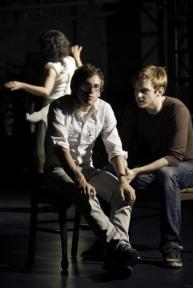(never underestimate) The Power - where were you when the lights went out

(never underestimate) The Power, presented by One Reed Theatre and directed by Paul Thompson, is constructed from a series of monologues/vignettes created by writer-performers, Evan Webber, Frank Cox-O’Connel and Megan Flynn. An exploration of how three different characters were effected by and perceived the August 2003 Blackout (never underestimate) The Power, is set on Toronto’s Queen Street West on the day the power went out.
The three characters – a directionless young man, a disenchanted factory worker and a Queen West chanteuse – share their perspectives on the world, their place in it and some scattered views on the “End of Days”. The weakest moments in (never underestimate) The Power are three brief scenes where the characters interact with one another. The loose connections between the characters seem forced and unnecessary. It is easy to appreciate Thompson’s desire to weave the three characters together but they are already connected by their perspectives and by the common event of The Blackout.
The style of (never underestimate) The Power is interestingly casual while still being theatrical. The characters tell their stories in direct address to the audience that has the tone of a neighbor telling you about his day rather than a professional story-teller painting a picture. However, the performers still do manage to paint vivid pictures just that it is done with such ease that they seem to be not be performing at all. There are the slight hesitations and hiccups that occur whenever a real person is telling you about something that has happened to them. There are times where the dialogue sounds and feels as if it may be improvised and this is probably because the actors are also the writers.
Another interesting convention that Thompson uses is to not separate the realities of the various story-tellers. The standard convention with direct address speeches - whether monologues or soliloquies - is to have one character speaking, possibly in a spotlight, while the rest of the characters sit or stand in the dark, apparently oblivious to sharing the stage and the passage of time. However, in (never underestimate) The Power while one actor addresses the audience, the other performers listen with great interest. The listening actors do not react much (probably because it would be distracting) but they are clearly aware of and attentive to the stories of the other two. In this way, the obliviousness rests not on the other performers but on the speaker, who is aware only of the audience.
Direct address lends itself easily to interactive performances and story-telling but this show never crosses that line. We are not “expected” to react and our reactions do not affect the characters although the audience does seem to be playing a part in the proceedings. We are not talked to as if we are an audience in August 2008 but rather as if we are an audience in August 2003, experiencing the Blackout along with the cast.
The production also makes effective use of live music. As a singer, Fynn’s character uses short songs as part of nearly all her monologues. Her stories have less continuity than the others because she tells a different story for every song but she does create what feels like an intimate and personal concert. The music is composed and played by David Stein and Michael Louis Johnson, who also play as the audience enters and then often throughout. The compositions are played with skill, detail and passion, adding a strong emotional centre to the work.
(never underestimate) The Power by the company; Directed by Paul Thompson; Presented by One Reed Theatre w/ Paul Thompson; Featuring Frank Cox-O’Connell, Megan Flynn, Evan Webber. Part of the 2008 SummerWorks Festival. No remaining performances but feel your way here for more information.



